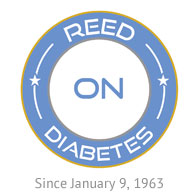In 1920-1921, a Toronto laboratory dog’s pancreas was removed; a hormone from the displaced organ was isolated and then injected back into the dog. The results were amazing … the symptoms of the dog’s diabetes disappeared within days of injections. This hormone was named insulin. In 1922, insulin from animals was purified enough to try on humans. These results were as impressive as those in the dog.
Before insulin, people diagnosed with diabetes had a bleak future: starvation diets followed by coma and death. This happened over months. Simply put … a diagnosis of diabetes was a death sentence.
After 1922, insulin provided those diagnosed with diabetes a lifeline – a way of extending our lives. It allowed some – including me – to experience lives much longer and more productive than those diagnosed before its’ discovery and deployment.
I was diagnosed in 1963, 40 years after insulin was discovered and made available for treatment. In those 40 years, advances were made to delay and extend insulin duration. Since my diagnosis, advances have included bio-genetically engineered human insulin and designer insulins that altered protein structures, resulting in faster-acting insulin.
I am humbled by the good fortune I had to be diagnosed when insulin was available to treat diabetes. Without it, I would not have been alive to attend kindergarten or live the life I’ve known. Faster-acting insulin developed in the 1990s improved my quality of life.
I am grateful to the medical research team in Toronto, Canada, that so expertly hypothesized, isolated, and purified the pancreatic hormone called insulin. I also appreciate the previous generations of medical researchers studying diabetes. Their time and thought provided increasing knowledge that enabled the miracle discovery of insulin.
Finally, I appreciate the companies that took risks to develop insulin and make it commercially available. Discovery is one thing … making it available is another. The total insulin market is small compared to other pharmaceutical opportunities. Only with these companies’ investment and commitment can I access my lifeline.
+ There are several book on the discovery of insulin … I particularly enjoy The Discovery of Insulin by Michael Bliss.


